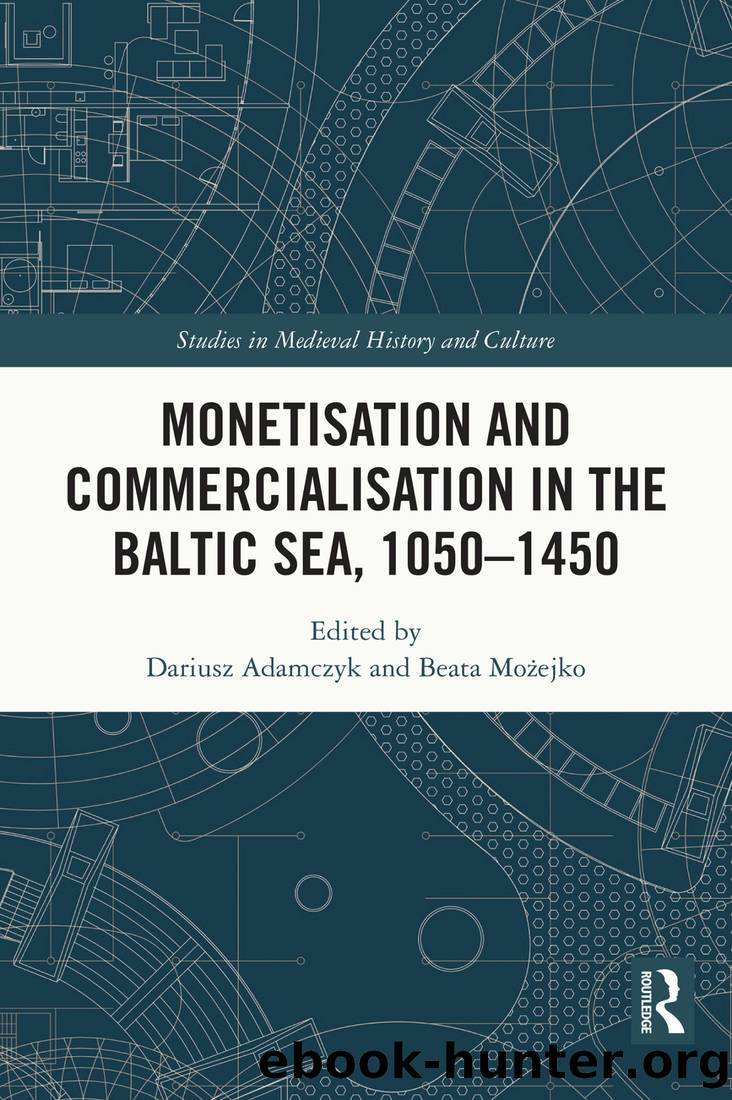Monetisation and Commercialisation in the Baltic Sea, 1050-1450 by Dariusz Adamczyk;Beata Moejko; & Beata Możejko

Author:Dariusz Adamczyk;Beata Moejko; & Beata Możejko [Adamczyk, Dariusz & Możejko, Beata]
Language: eng
Format: epub
ISBN: 9781000382525
Publisher: TaylorFrancis
Published: 2021-02-24T17:44:39+00:00
Concluding remarks
With the rapidly progressing commercialisation and monetisation of the economy in various European regions during the high and late Middle Ages also the use of money within trade changed accordingly. Merchants all across Europe developed techniques to circumvent the notorious shortage of precious metals and the ever-rising diversity of local currencies, and within long-distance trade they began to use book money, minimised the number of risky coin transfers, and finally, tried to avoid payments in cash. Similar to other European regions, trade in Northern Europe had also reached this new level of monetisation â that is, merchants were substituting financial instruments for cash wherever and whenever possible.
As well as other merchant groups, the Hansards used book money, and reduced the number of cash transfers to a minimum possible. However, the Hansards did not employ sophisticated financial instruments like the Italian merchants did. And even though they knew about these more modern financing techniques, they were barely an attempt to copy these techniques. Within much of their internal trade, the Hansards held on to the practice of reciprocal trade which allowed them to avoid the transfer of real money. Interestingly enough, this informal pattern of trade was so simple that sophisticated financial instruments, by which merchants can draw on credit or transfer payable debts, were not necessary either. Thus, the Hansardsâ use of money within long-distance trade was extremely limited, indeed, but as reciprocal trade was embedded in a reputation-based kinship and friendship network, this practice proved for long to be efficient and viable.
For the period around 1500, there is no question that reciprocal trade had actually become inefficient and seriously inhibited both the development of trade and economic growth in the Baltic Sea region. For this reason, it should, of course, have been replaced by more efficient institutions of trade. However, due to the mutual interdependence of the trading network and the practice of reciprocal trade the merchants of the Hanse were hardly able to change their trading habits and adopt more modern techniques of finance. Thus, the Hansardsâ use of financial instruments remained limited. This lock-in was the result of individual rational decisions made by the merchants in the short term, but it meant that in the long run the Hansards could neither expand their business nor even maintain their long-standing trade cartel. For them, taking a step further to reach an even higher level of monetisation where finance would have become an important element of economic development and growth was simply impossible.
Download
This site does not store any files on its server. We only index and link to content provided by other sites. Please contact the content providers to delete copyright contents if any and email us, we'll remove relevant links or contents immediately.
Room 212 by Kate Stewart(5105)
The Crown by Robert Lacey(4807)
Endurance: Shackleton's Incredible Voyage by Alfred Lansing(4769)
The Iron Duke by The Iron Duke(4349)
The Rape of Nanking by Iris Chang(4203)
Joan of Arc by Mary Gordon(4101)
Killing England by Bill O'Reilly(3995)
Say Nothing by Patrick Radden Keefe(3975)
I'll Give You the Sun by Jandy Nelson(3428)
Shadow of Night by Deborah Harkness(3360)
Hitler's Monsters by Eric Kurlander(3328)
Mary, Queen of Scots, and the Murder of Lord Darnley by Alison Weir(3202)
Blood and Sand by Alex Von Tunzelmann(3195)
Eleanor & Park by Rainbow Rowell(3153)
Darkest Hour by Anthony McCarten(3119)
Margaret Thatcher: The Autobiography by Thatcher Margaret(3079)
Book of Life by Deborah Harkness(2931)
Red Famine: Stalin's War on Ukraine by Anne Applebaum(2928)
The One Memory of Flora Banks by Emily Barr(2857)
